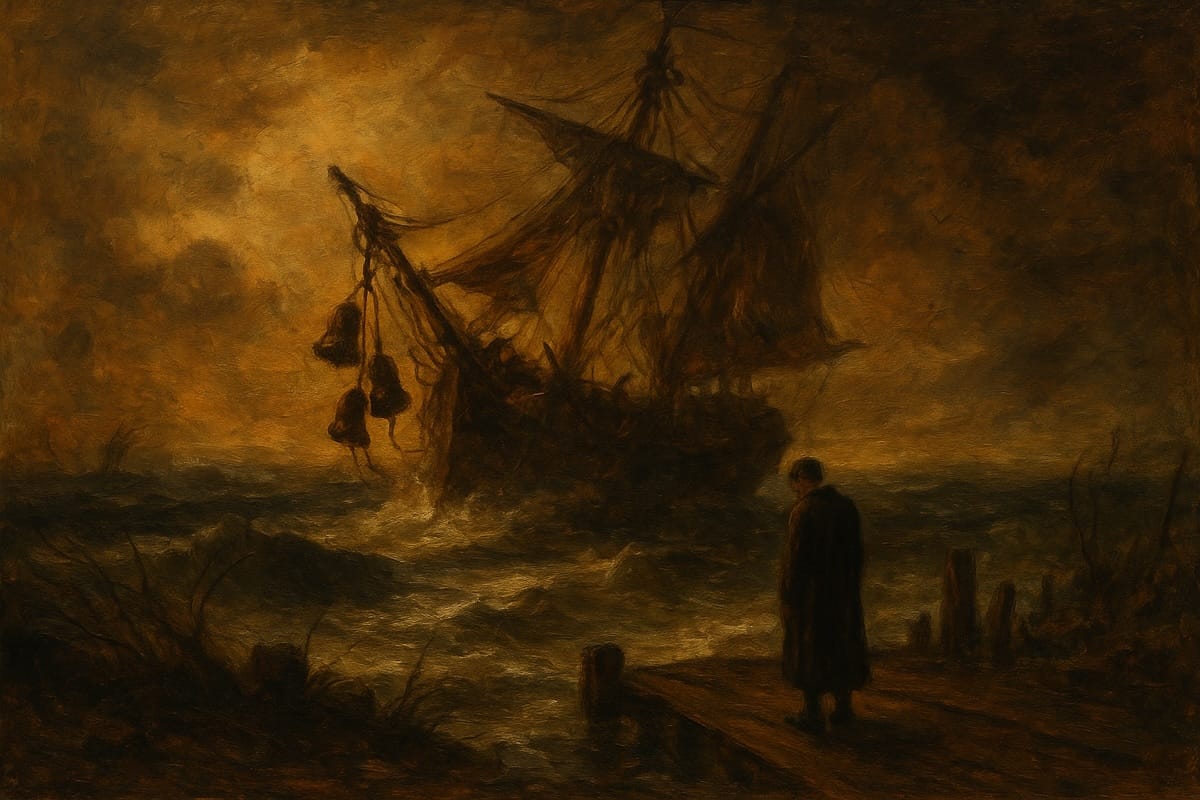There exists no visible disquiet in his expression, no tremor betraying hesitation. He inhabits a profound stasis, that eerie tranquillity peculiar to those who have not merely confronted the abyss but metabolised its logic, made it flesh and sinew. With each ascent into the stratosphere, as the aircraft cleaves through atmospheric layers like a knife through silk, he surrenders to a meticulously cultivated anticipation. Those wings, to him, are not symbols of transcendence but fragile extensions of hubris, metal bones awaiting their inevitable, their beautiful collapse.
He does not merely fantasise about structural failure; he architects intricate internal scenarios with the precision of a mortician arranging limbs. The fuselage, torn midair like paper in the hands of an angry god. The shriek of decompression, that obscene symphony of physics reclaiming its dominion. Oxygen masks dangling like shrivelled fruit from a poisoned tree, theatre without salvation, props in humanity's final performance. He savours the ugliness of panic, how it would transform the civilised into the primal, strangers clawing at strangers whilst he remains still, a stone in the river of chaos. The quiet satisfaction blooms in him like a cancer, this imagined dissolution. Catastrophe, in its terrible aesthetics, soothes him more profoundly than safety ever could, ever would.
Survival is not his aim. He wishes dispersion, atomisation, the kind of ending that leaves nothing for mourners to gather around.
To become a fragmented datum on a cockpit voice recorder, a series of numbers without narrative. A spectral trace smeared across an autopsy table log, a body so utterly obliterated it evades ritual, eludes grief, refuses the indignity of a funeral where people lie about who you were. He does not seek death for its finality but for its absolution, its sterile purity. The kind of end that admits no eulogy, no posthumous rehabilitation of character.
His condition resists the reductive classifications of clinical psychology, those neat little boxes therapists use to contain the uncontainable. There is no foundational trauma here, no tidy narrative of abandonment to appease the discomfort of those who need reasons, who hunger for causality like addicts. No lover waits for him. No mother weeps. No origin wounds fester. He is not broken; he is lucid, perhaps too lucid. He apprehends the world as theatre, a grotesque carnival of delusion rehearsed daily through rituals of production, affection, survival, all those little lies we tell ourselves to justify waking up tomorrow. In this masquerade of continuity, of progress, of meaning, he has chosen refusal. Not escape, understand, but abstention, the way one might decline an invitation to a party one never wished to attend.
He does not request rescue. He invites erasure, courts it like a lover.
Impact is not a threat; it is liberation from the tyranny of repetition, from the endless fucking loop of consciousness recycling itself. He does not long for death, precisely, but despises the grotesque endurance of breath, how the body insists on continuing its vulgar processes regardless of consent. Every involuntary inhale is a betrayal of his epistemic revolt, every heartbeat a collaborator with the enemy. Every morning arrives like an unwanted guest, a vulgar continuity he no longer consents to but cannot legally refuse.
When the landing is smooth, when the cabin erupts with the jubilant relief of those still invested in their own repetition, those who celebrate mere survival as victory, he remains inert. Eyes open. Hands clenched around armrests like a corpse refusing to let go. The heart within him, that traitor organ, echoes his disappointment with each stubborn beat.
So he smiles.
Not because he feels better. Not because anything changed. But because now he knows, really fucking knows, that the thing inside him isn't rare or special or unique. It's a parasite with a million mouths, whispering to more people than he'll ever meet, spreading its gospel of negation through the neural networks of strangers. The trick isn't killing it, because you can't murder what feeds on death wishes. The trick is starving it, calling its bluff, looking it dead in its absence of eyes and saying "fuck you." Standing up when your bones feel like lead, brushing your teeth when your mouth tastes like graves, drinking water when you'd rather drown, texting someone, anyone, anything, "still here" or "thinking of you" or just a fucking emoji, because none of it makes sense and that's exactly, precisely, absolutely why it matters. Not for meaning, Christ no. For rebellion. For spite. For the middle finger you raise when your own brain, that treacherous meat computer, tells you to disappear. That smile of his, it's not hope, never mistake it for hope. It's war paint. It's the grin of someone who's decided to live out of pure fucking malice, to exist as an act of violence against the void that calls his name.
And sometimes, beloved reader, that's enough. Sometimes spite is the only prayer that reaches heaven, the only language the universe understands.

